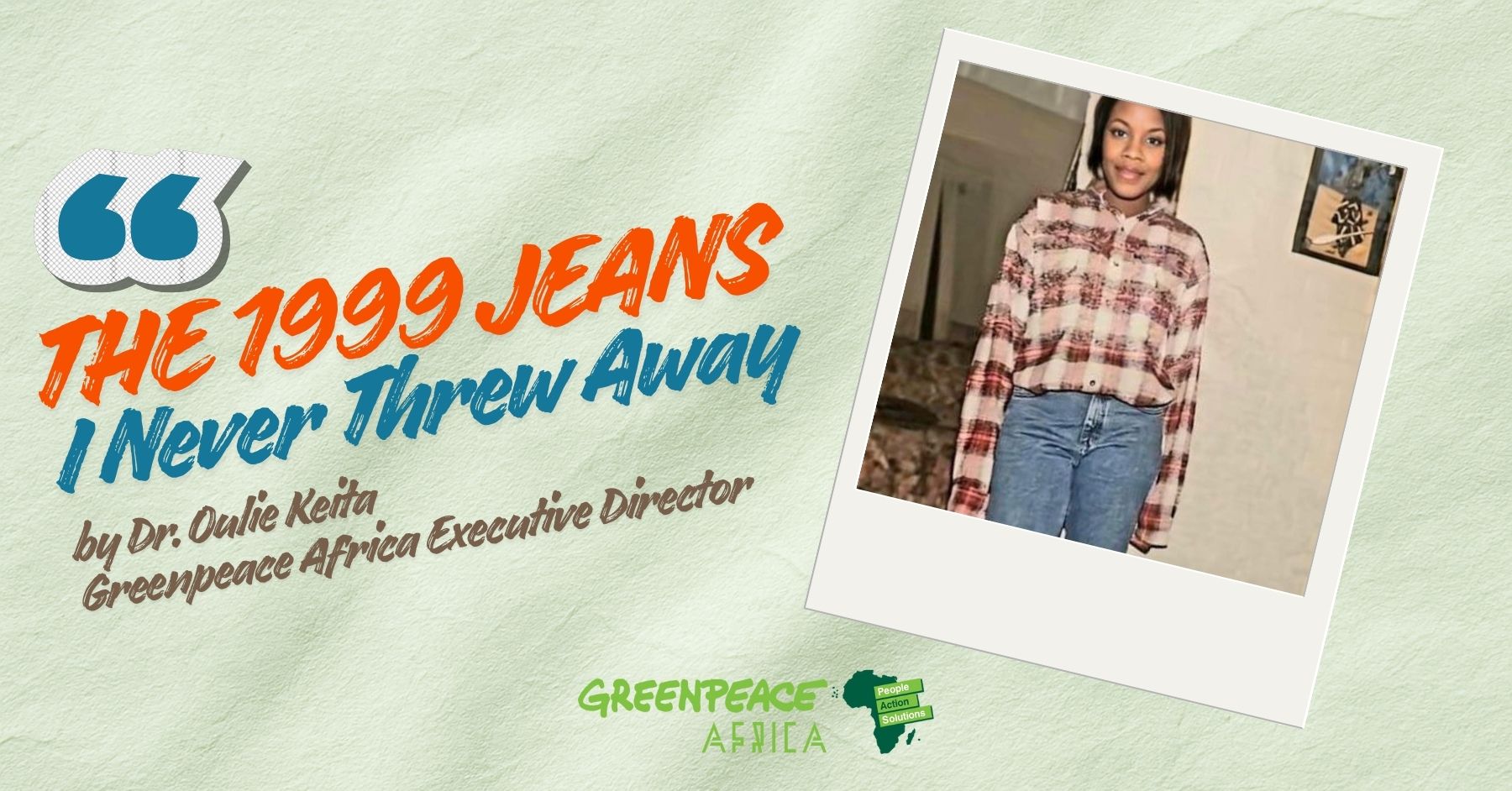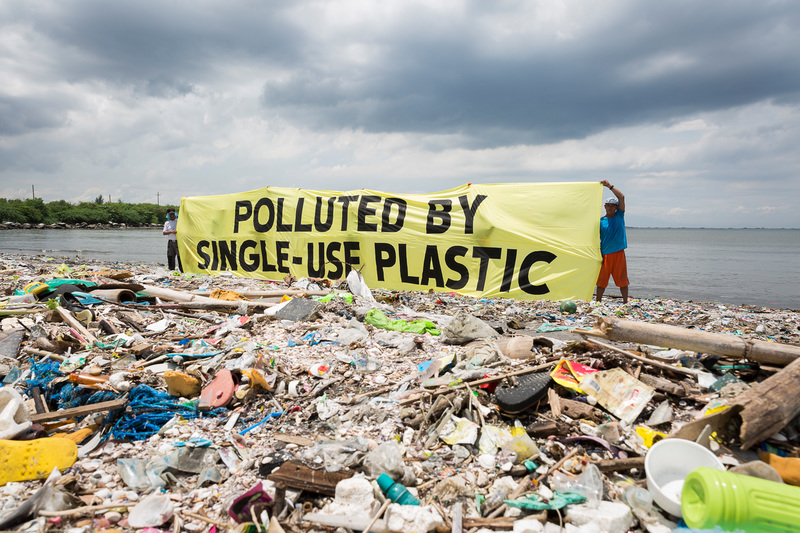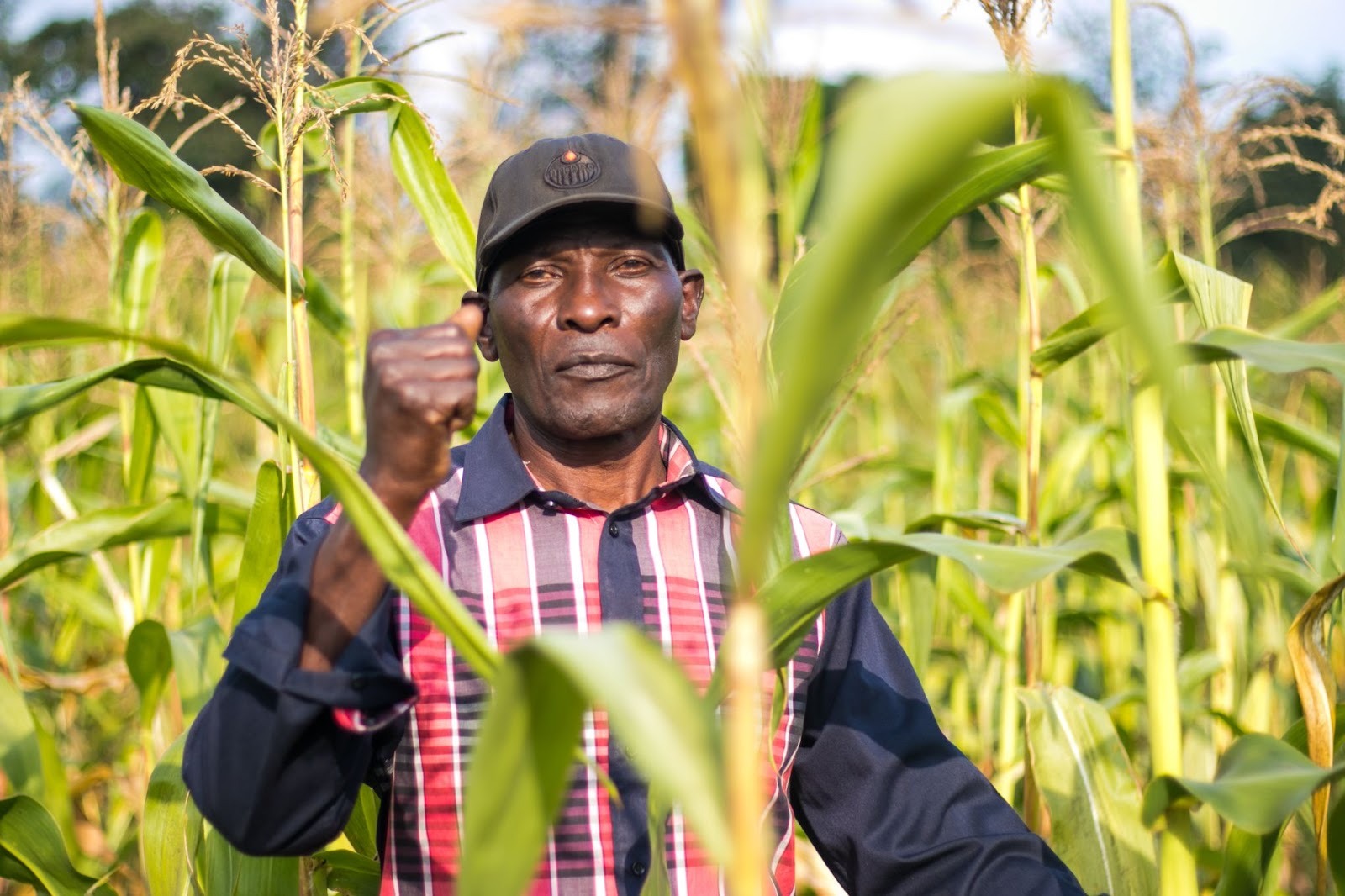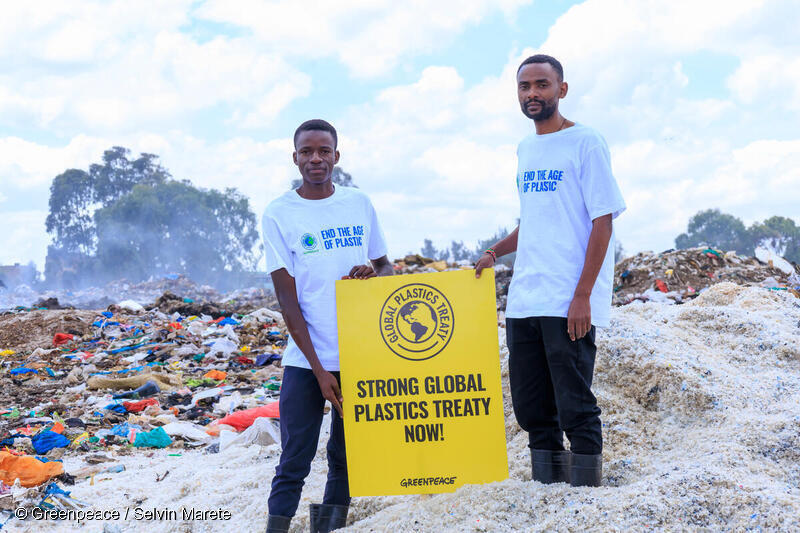
Plastic pollution casts a long shadow, affecting nearly every corner of the world and every facet of our lives. From communities suffering the consequences of plastic waste and its effects on health and livelihoods to environmental and climate degradation, the scope of the problem is extensive.
In the face of this mounting global crisis, the world’s attention is increasingly turning towards finding a realistic solution that works globally.
To this end, the Global Plastics Treaty represents a once-in-a-generation opportunity to finally turn off the tap and end the age of plastic. The third session of the Intergovernmental Negotiating Committee meeting (INC3) to develop an international legally binding Global Plastics Treaty is happening now in Nairobi, Kenya. At this meeting, Africa has an opportunity to show its true leadership in addressing the plastic pollution crisis that has had a huge impact on the continent. We are calling upon African leaders to adopt a progressive plan that cuts plastic production by at least 75% by 2040 and show that they are on the side of people, not corporate profit.
About the Global Plastics Treaty process?
Last year, we secured a mandate to develop an international legally binding instrument that covers the entire lifecycle of plastic, from extraction to end of life. Unlike other treaties, this will be a sprint and not a marathon. The future treaty is expected to be ratified in mid 2025.
If ambitious enough, the future treaty could solve the health, social and planetary crisis brought by rampant plastic production. It could create binding global rules that apply to all countries rather than a voluntary agreement where governments can choose to implement or ignore.
The first two negotiating meetings, INC1 (Punta del Este, Uruguay) and INC2 (Paris, France) focused on procedure and we already saw that this process will be a tough battle with oil and gas producing countries that would aim to slow down the negotiations and dilute the treaty text.
The Zero Draft of the treaty was released in September this year, which means that INC3 holds significant importance because the delegates will start discussing the content and shaping the future treaty. Our objective should be to encourage highly ambitious countries to take the lead in advocating for a treaty that significantly cuts plastic production, aiming for a reduction of at least 75% by 2040. This reduction is imperative to keep global warming within the target of 1.5 degrees Celsius.
Why is an ambitious Global Plastics Treaty urgently needed – a close look at the plastic pollution crisis by the numbers
- Plastic pollutes throughout its entire life cycle, from extraction to disposal
- Plastics are a significant threat to our climate – 99% of plastics are made from fossil fuels
- Plastic production is a major driver of the climate crisis and accounts for approximately 3.4% of global greenhouse gas emissions.
- The global production and consumption of plastics has increased exponentially in the past 50 years from 15 million tonnes in 1964 to more than 300 million tonnes today; and is predicted to double in the next 10-15 years.
- To date, it is estimated that only 9% of all the plastic ever produced has been recycled globally, and production is projected to triple by 2050.
- Plastics are made with over 13,000 chemicals. Many of these are toxic and are known to cause cancer, nervous system issues, and hormonal disruptions.
- CIEL estimated that, in 2019 alone, the production and incineration of plastic products created greenhouse gas emissions equivalent to 189 coal-fired power plants
- The Fossil Fuel industry is investing billions in plastic production. If the industry has its way, plastic production could double within the next 10-15 years, and triple by 2050.
- Greenhouse gas emissions from single-use plastics in 2021 were equivalent to the total emissions of the entire United Kingdom, (460 million tonnes CO2e) and most of these emissions come from production.
- If we continue with business as usual then by 2050 plastic production could have eaten up 13 percent of the Earth’s remaining carbon budget and by 2100 at least half, according to a CIEL analysis.
Read here for more plastic facts
The Magnitude Of The Plastic Pollution Problem: The Full Lifecycle Of Plastic?
Nearly every piece of plastic begins as a fossil fuel, and greenhouse gasses are emitted at each stage of the plastic lifecycle. Plastic pollutes throughout its entire lifecycle, from extraction to distribution and disposal.
It exposes people who live on the frontlines of fracking sites, next to incinerators, or in highly polluted regions that serve as the world’s dumping grounds, to a range of harmful chemical pollutants.
We need a strong treaty that will ensure a just transition to a low-carbon, zero-waste, reuse-based economy that centres justice and the interests of communities most affected. A strong Global Plastics Treaty delivers a cleaner, safer planet for us and for future generations.
Governments must open inclusive and justice-centered discussions for people being harmed across the plastics supply chain and ensure that the INC conferences are free from industry interference.
Causes Of Plastic Pollution and The Solutions That an Ambitious Global Plastic Treaty Can Provide
1. Big Oil & Plastic Production By The Top 5 Plastic Polluters
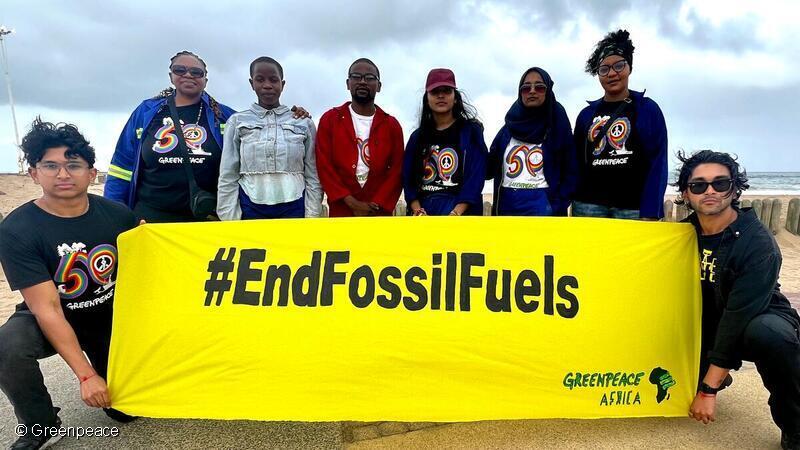
Plastic pollution exacerbates the climate crisis, with a staggering 99% of plastics originating from fossil fuel sources. In 2022 the BFFP brand annual audit identified the world’s top 5 polluting corporations: Coca-Cola, Pepsico, Nestle, Unilever and Mondolēz International.
Big oil and gas working hand in hand with big fast-moving consumer goods (FMCG) corporations, such as Unilever and Nestle, have inundated African nations with single-use plastics, including impossible to recycle sachets, disregarding the significant toxic environmental and societal consequences that plastics have on local communities.
The extensive deployment of small plastic sachets in Unilever and Nestle product lines within developing regions has substantially exacerbated the problem in Global South countries that bear a disproportionate burden of plastic waste and pollution.
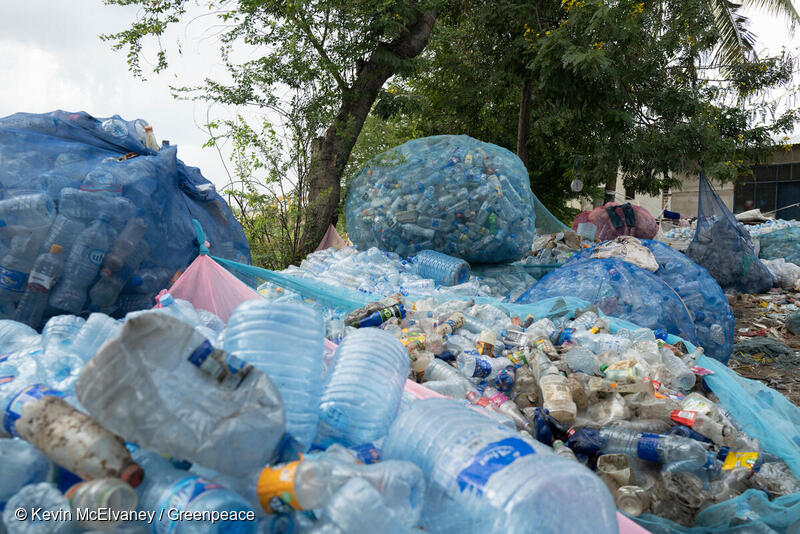
Although Coca-Cola’s pledge in February 2022 demonstrates the viability of implementing reuse and refill practices on a global scale, it alone is insufficient to effectively combat the plastic pollution crisis. Greenpeace Africa strongly asserts that Coca-Cola must develop a roadmap detailing how it will phase-out all single-use plastic packaging from its operations and pivot to reusable packaging within ten years.
To effectively address the plastic pollution crisis and end the throwaway culture, major corporations like Coca-Cola, Pepsico, Nestle, Unilever and Mondolēz must commit to end its use of plastic sachets by the end of 2025 and lead work to enable the Global Plastics Treaty to deliver a global sachet ban, support Greenpeace’s calls for the Global Plastics Treaty to set a global target to cut plastic production by at least 75% by 2040 and develop a roadmap detailing how it will phase-out single-use plastic packaging from its operations and pivot to reusable packaging within ten years, prioritising the elimination of sachets and other flexible plastics.
As we engage in negotiations surrounding the Global Plastics Treaty, it is imperative for governments and FMCG companies not to echo the interests of the petrochemical industry. We must avoid allowing oil-producing nations, acting on behalf of large oil and petrochemical corporations, to dominate, obstruct, or dilute the treaty discussions and diminish its ambition.
The Global Plastics Treaty presents an opportunity to rein in these polluting entities.
2. False Solutions Perpetuated by Big Oil Such As The Recycling Myth
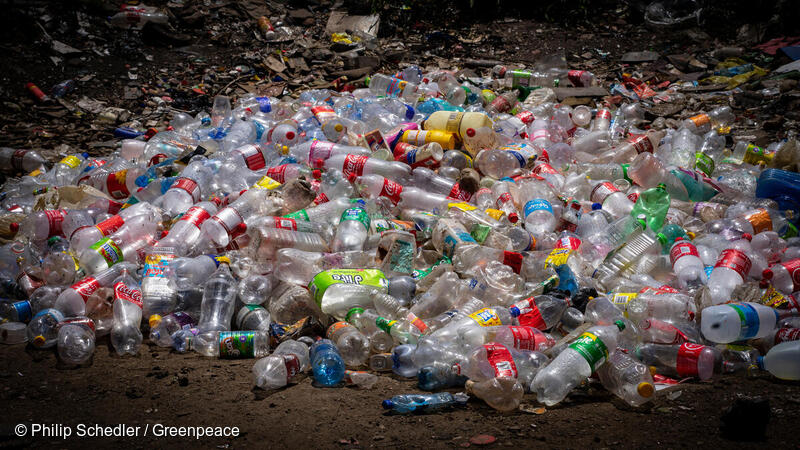
It is clear from current plans by big brands like Unilever, Nestlé, and Coca-Cola that they intend to remain dependent on using single-use plastic to deliver their products. These big brands are betting on false solutions like recycling, incineration and a switch from one throwaway material to another.
Chemical recycling is a risky, expensive, energy-intensive, and potentially hazardous technology pushed by the plastic industry to protect business as usual. These types of unproven technologies only encourage more fossil fuels to be extracted and more plastic to be produced, generating more pollution that harms communities and the climate.
Bad packaging design, a lack of infrastructure, and the absence of a means to track plastic waste all limit the effectiveness of recycling, and ensure that most plastic packaging will continue to become waste for the foreseeable future.
The idea that we can recycle our way out of this crisis is a lie pushed by the fossil fuel industry. We need decision-makers to support a strong plastics treaty that cuts plastic production by at least 75% by 2040 and to invest in refill and reuse.
If small businesses in countries like Kenya, guided by government policies, are switching to reuse systems, then multi-million dollar brands like Unilever, Nestlé and Coca-Cola have no excuse not to do the same at scale.
3. Waste Colonialism
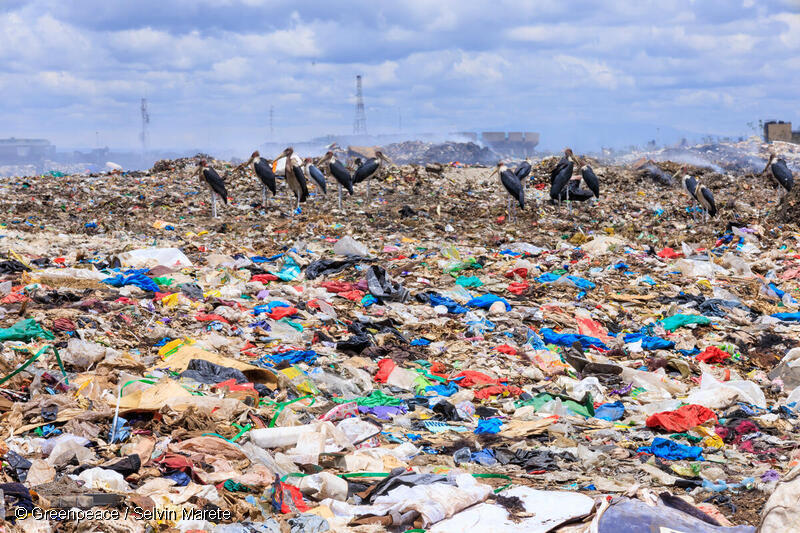
Waste colonialism, particularly within the plastic industries, looms large. Africa has borne the brunt of being a dumping ground for waste from more developed countries for ages. The Global Plastics Treaty assumes paramount importance as it offers a framework to address this grave concern, stopping waste colonialism and ensuring responsible waste disposal and safeguarding African ecosystems.
Governments must end the continuing waste trade and uphold the Basel Convention Plastic Waste Amendment that prohibits the export of hazardous plastic waste to developing, non-member countries of the Organisation for Economic Co-operation and Development.
Supporters of disposable plastics are advocating for increased plastic production and its exportation to Africa. Such actions have the potential to erode the advancements made by African nations in their fight against plastic pollution. The essential solution lies in fostering cooperation among African Member States to confront these issues and put an end to the unlawful and neo-colonial approach to managing plastic waste originating from more developed countries in the Global North.
4. Just Transition Away From The Plastic Economy
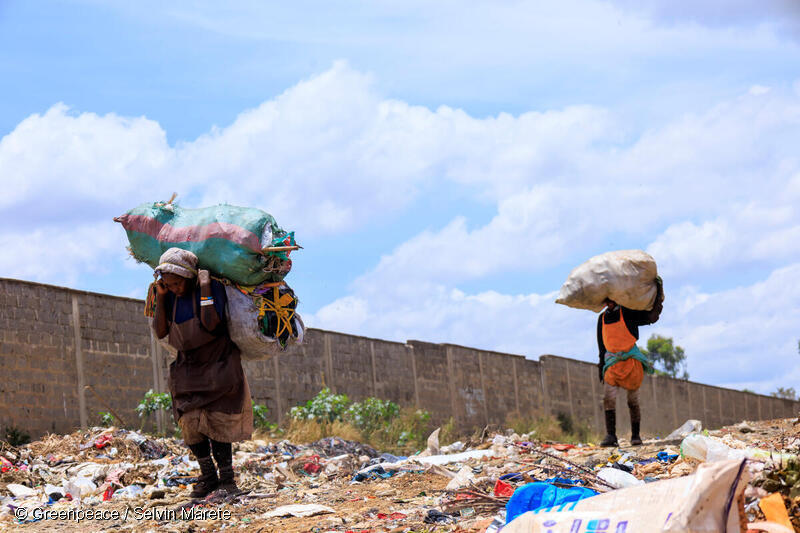
Indigenous communities, frontline groups, waste collectors, and laborers are advocating for a fair transition to tackle the plastic pollution crisis. It’s essential for both the oil and gas and plastics industries to take responsibility and work towards a low-carbon, zero-waste, and reuse-oriented economy.
The oil and gas industries should not exploit waste collectors to justify their polluting practices. Waste collectors are responsible for gathering up to 60% of the 9% of plastic waste collected globally for recycling, preventing the entire system from collapsing.
Communities living on the frontlines of the plastic crisis continually face exposure to petrochemicals and various forms of pollution, which jeopardizes their health. Additionally, the increasing production of plastics poses daily economic, social, and human rights challenges. Their input is indispensable to ensure the realisation of a robust and ambitious treaty.
Major corporations must act promptly and establish mechanisms to accelerate the reduction of plastic production. They need to shift away from unsustainable business models and provide support for workers and their families during this transition. This includes investing in their skills and creating pathways to employment opportunities in sustainable alternatives.
Greenpeace will work with, support, empower, and as appropriate, advocate for affected workers to ensure a just transition to a low-carbon, zero-waste, reuse-based economy that centres justice and the interests of communities most affected as we negotiate for a strong Global Plastics Treaty that will address the full lifecycle of plastics.
The Far-Reaching Impacts of Plastic Pollution
Plastic pollution’s impacts are deeply woven into the fabric of our lives, affecting communities, ecosystems, livelihoods, and health.
1. Accelerates The Devastating Impacts Of The Climate Crisis
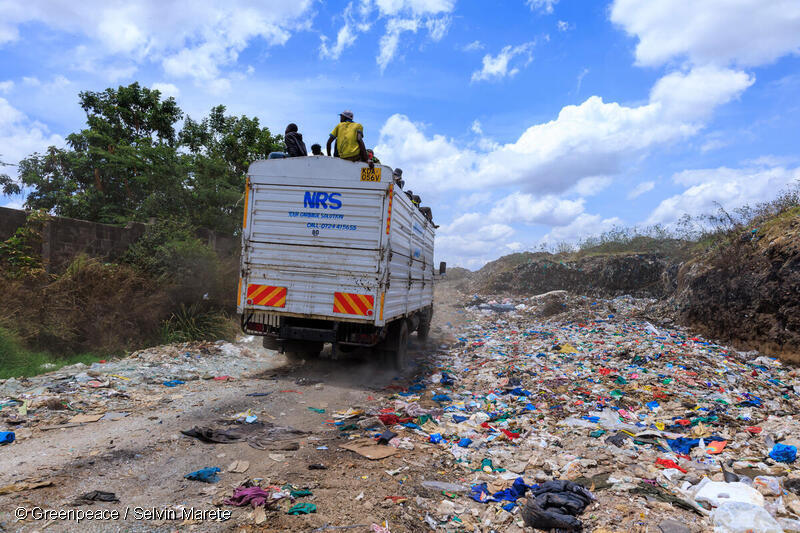
Plastics are manufactured from and driven by fossil fuels, specifically oil, gas, and coal. Fossil fuel dependency is what big corporations like Coca Cola are leading us towards with their insistence of the continued use of throwaway plastic.
Plastic production is closely tied to the fossil fuel industry, primarily through the extraction and processing of petrochemicals. The energy-intensive process of converting petrochemicals into plastics contributes to greenhouse gas emissions. As the demand for plastic continues to grow, so does the need for fossil fuels, thus increasing emissions and accelerating climate change.
While we are making a shift away from fossil fuels to cleaner energy sources, the fossil fuel industry sees single use plastic as a lifeline and is actively directing substantial financial investments towards expanding plastic production. This is in response to the increasing demand for plastics.
Should we fail to curtail both the production and use of plastics, we will find ourselves unable to break free from our dependence on fossil fuels, along with the detrimental consequences they impose on the environment, oceans, and communities.
Presently, plastics contribute to 3-4% of the global greenhouse gas emissions. If the trend persists, this figure is poised to triple by the year 2050.
2. Social Injustice
Plastic pollution has adverse effects on our human rights at every stage, from manufacturing to disposal. It exacerbates social injustices, contributes to environmental deterioration, and compounds the disparities intensified by the climate crisis.
Across the globe, disadvantaged communities bear a disproportionate burden of the plastics industry’s adverse health effects, stemming from petrochemical plants, waste incineration, landfills, contaminated water bodies, and the illegal incineration of imported plastic waste.
Plastic production has a particularly harsh impact on low-income and marginalized communities worldwide and is associated with health problems such as cancer and asthma. Yet, major corporations are disregarding these consequences and evading their accountability for them.
3. Flooding That Leads To The Loss Of Life
Growing plastic production is a major problem for coastal communities that already experience some of the damaging impacts of climate change: flooding, sea level rise and more extreme weather events like hurricanes.
Reducing plastic pollution is not only critical for environmental and human health but also for mitigating its contribution to flooding events.
Plastic pollution can indirectly contribute to flooding through a variety of mechanisms:
Clogging of Drainage Systems: Plastic waste, especially single-use items like bags and bottles, can block stormwater drains and sewer systems. When these systems become clogged with plastic debris, water cannot flow properly, leading to localised flooding during heavy rains.
Blocked Waterways: In coastal areas and regions near rivers, plastic waste can accumulate in water bodies. Large plastic debris can block waterways and reduce the flow capacity of rivers and streams. When these water bodies overflow during heavy rains, they can inundate nearby areas, causing flooding.
Plastic Waste as Flood Debris: After flooding occurs, plastic debris in the water can exacerbate the damage by obstructing drainage systems, water pumps, and natural water flows. This hinders floodwaters from receding efficiently and can lead to prolonged flooding events.
4. Microplastics Are Turning Up In Our Food, Water And Air
There is no better example of how the plastics crisis touches every corner of our daily life than the existence of microplastics.
The emergence of microplastics, a byproduct of plastic degradation, poses a particularly menacing threat. These minuscule particles infiltrate our environment, contaminate water sources, and infiltrate the food chain, posing health risks to both wildlife and humans.
The scientific community is in the early stages of comprehending the prolonged consequences of plastic on human health. Nevertheless, they have already detected microplastics in the air we inhale, the food we consume, and, astonishingly, even in our internal organs and bloodstream.
Throughout the entire lifecycle of plastic, from its production to its disposal, our continuous interaction with and ingestion of plastic materials pose a significant threat to our health and well-being.
5. Destroys Our Biodiversity
Plastic pollution has far-reaching and detrimental effects on biodiversity, with impacts that ripple through ecosystems, leading to population declines, habitat degradation, and disruption of natural processes.
Habitat Alteration or Destruction: Plastic pollution can alter natural habitats. Plastics in the environment can smother or suffocate coral reefs, seagrasses, and other ecosystems, leading to habitat loss and degradation. Plastic debris can also accumulate in wetlands and terrestrial environments, affecting plant growth and altering landscapes.
Chemical Contamination: When animals ingest plastic particles, they may also be exposed to toxins. This chemical contamination can harm organisms at various levels of the food chain, potentially leading to population declines and ecosystem disruption.
Transport of Invasive Species: Plastic debris can act as a raft, carrying organisms from one location to another. This can lead to the introduction of invasive species in new ecosystems, causing ecological imbalances and threats to native species.
Africa’s Trailblazing Efforts in Combating Plastic Pollution
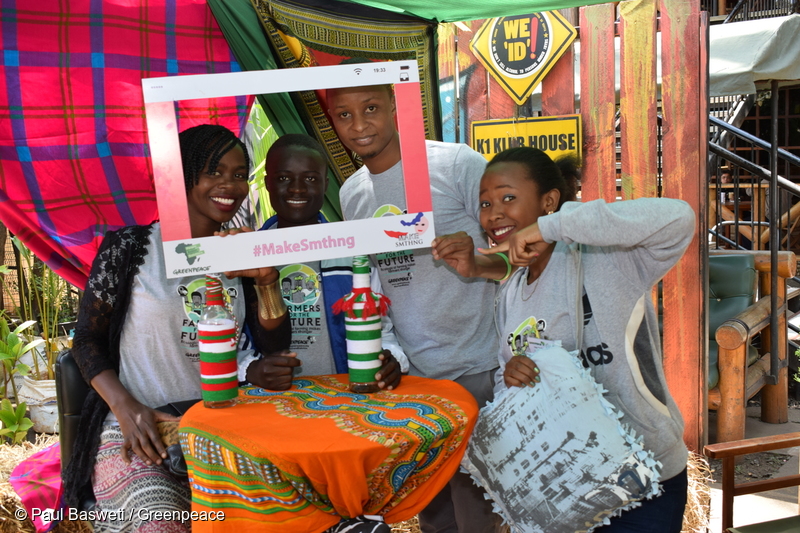
In the face of adversity, Africa still manages to deal with plastic pollution in creative ways that are passed down from culture and continent’s innovation. Africa’s pioneering spirit, its tales of achievement and trailblazing efforts, are underlined in the endeavors listed below.
- Bring Your Own Bag Campaigns: In South Africa and Kenya, this campaign encourages people to reduce the use of disposable plastic bags. Many retail outlets and restaurants in the country have taken a stance to stop distributing single-use plastic bags.
- Circular Economy Initiatives: In Kenya, a company called “African Collect Textile” collects used textiles for reuse. Through their work, they are kickstarting a circular economy for textiles. This is done by diverting used textiles and footwear from landfills, and by supporting the environment and creating jobs where clothes are brought to seek new life against the waste in landfills
- Reuse and Refill Systems: All over Africa, refillable glass soda bottles are encouraged and promoted, along with the sale of returnable bottles. In Kenya, it is common to find water refill stations in supermarkets or local kiosks. In Nigeria, already-used bottles for soft drinks are reused to bottle processed products of maize, guinea corn, and millet. In Kenya, supermarkets have milk ATMs for refilling milk rather than consumers having to buy milk pre-packaged plastic bottles.
- Bans on Single-Use Plastics (Various African Countries): Many African nations, including Kenya and Rwanda, have introduced bans on single-use plastics such as plastic bags. These bans have played a pivotal role in reducing the use of disposable plastics and minimizing their environmental impact.
No doubt that these efforts are making a difference but a Global Plastics Treaty can significantly accelerate the transition to a plastic free future.
At INC-3 happening this week, we aim to show how a strong global movement can achieve an ambitious Global Plastics Treaty that will finally end the age of plastic for our children, communities, climate and the planet.
Greenpeace’s Imperative Demands: A Clarion Call for Action
Greenpeace Africa’s call for action is ambitious, but vital:
- The Global Plastics Treaty must be committed to reducing overall plastic production by a minimum of 75% by the year 2040, securing our climate at or below the 1.5°C target. This commitment is not only crucial for the environment but also for the protection of public health, our fundamental rights, and the well-being of our communities.
- Human rights should form the cornerstone of the Global Plastics Treaty. It should actively work to diminish inequalities, give paramount importance to human well-being, and center justice for all communities affected by plastic pollution.
- A successful treaty must also be dedicated to preserving biodiversity, mitigating climate change, and facilitating a just transition to an economy focused on reuse.
- Our call is clear: this treaty should halt the extraction of oil and gas and put a stop to the incessant production of plastic by major corporations and the fossil fuel industry. A robust plastics treaty has the potential to bring about a cleaner, safer planet that benefits all of earth’s citizens.
An Urgent Plea to African Governments
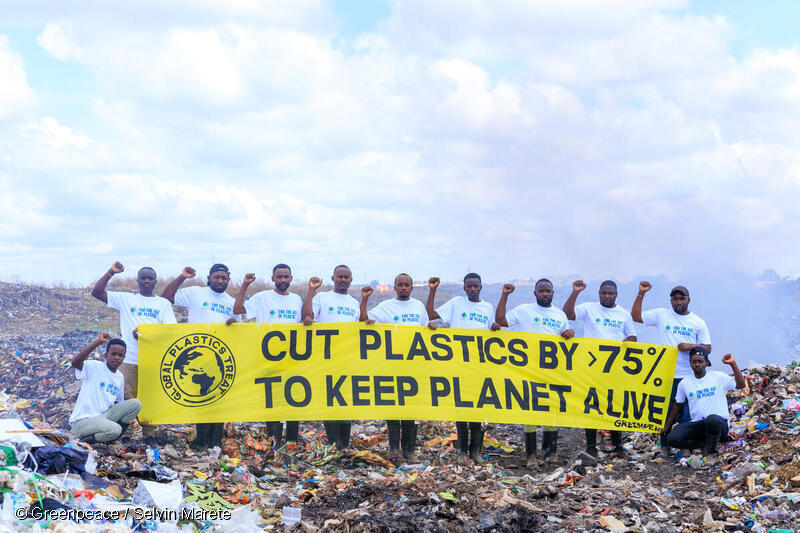
African governments must not overlook this pivotal moment. They have the power to shape the Global Plastics Treaty at INC-3. By championing the reduction of plastic production, strengthening waste management systems, and guarding their natural environments, African nations can emerge as global leaders in the fight against plastic pollution.
The Global Plastics Treaty is a once in a lifetime opportunity in our struggle against plastic pollution. Africa’s journey, marked by leadership, successes, and hurdles, accentuates the significance of these international endeavors. Greenpeace Africa’s demands to cut plastic production serve as a beacon for swift and decisive action. The call to African governments is clear: it’s time to assume the role of guardians of Africa’s people and lead the charge towards a cleaner, healthier, and more sustainable environment for future generations.
Africa’s governments must call for strengthened synergy with the Basel and Bamako conventions that will play a critical role in eliminating Africa’s added burden of plastic waste dumping.
With your help, we can influence Africa’s governments’ positions from low/medium ambition to high ambition in championing a strong Global Plastics Treaty during upcoming negotiations so that we can finally turn off the tap and end the age of plastic.
The Time Is Now.
What hangs in the balance is nothing short of the planet’s future and the well-being of its inhabitants. Time is running out to rein in plastic pollution and protect our environment. The Global Plastics Treaty presents a rare opportunity for nations worldwide to collectively act in a way that will lead to lasting, positive change.
We know that the petrochemical industry, corporations and some governments will try to weaken the ambition of the Global Plastics Treaty, and here is where the battle truly begins. The Global Plastics Treaty is a once-in-a-generation opportunity to solve the plastics crisis. For the sake of our collective future, we must not waste this moment.
We demand that governments commit to a strong Global Plastics Treaty that will reduce runaway plastic production and use by at least 75% and ultimately end the age of plastic.

